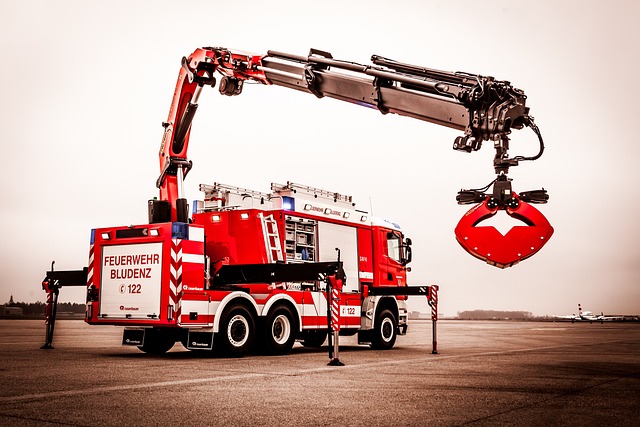Obtaining heavy haul permits and selecting appropriate Select Heavy Duty Trucks involves careful navigation of regional regulations, safety features, fuel efficiency, and route planning. Reputable dealers guide choices, ensuring compliance with dimensions, weight limits, and maintenance records for legal, efficient transportation of oversized loads while minimizing environmental impact. Stay within regulatory boundaries to avoid penalties and promote industry safety and efficiency.
Heavy haul permits are crucial for transporting oversized or unusual cargo. This comprehensive guide breaks down the essential legalities of understanding heavy haul permits, including key considerations when selecting heavy duty trucks to ensure compliance. We explore the application process, operating constraints, and enforcement penalties, providing vital insights for navigating these regulations successfully.
- Understanding Heavy Haul Permits: Essential Legalities
- Select Heavy Duty Trucks: Key Considerations for Compliance
- Application Process: Documents & Requirements
- Operating Constraints: Routes & Environmental Impact
- Enforcement & Penalties: Staying Within Regulations
Understanding Heavy Haul Permits: Essential Legalities

Heavy haul permits are crucial legal documents required for transporting oversized or exceptionally heavy loads. These permits ensure that vehicles, specifically designed to handle such tasks, meet specific safety and technical standards. When considering the acquisition of a vehicle for heavy hauling, understanding the permit requirements is essential. It involves navigating a process that varies by region but generally includes rigorous inspections and documentation.
Selecting the right heavy duty trucks, whether they are off-road capable heavy haulers or tough commercial truck options from reputable dealers, forms the first step. These trucks must be designed to withstand the stresses of hauling substantial weights, often exceeding standard vehicle capabilities. Reputable heavy duty truck dealers can offer guidance and ensure that the selected vehicles comply with local regulations, including permit requirements. This process involves verifying dimensions, weight capacity, and safety features, ultimately facilitating a seamless and lawful transportation experience.
Select Heavy Duty Trucks: Key Considerations for Compliance

When selecting heavy-duty trucks for operations that require a permit, it’s crucial to consider several factors to ensure compliance with regulations. The first step involves understanding the specific needs of your operation, including the type and weight of cargo to be transported, road conditions, and distance covered. Opting for reliable workhorse trucks for sale from authorised truck service centers is essential to guarantee not just performance but also timely maintenance and support. These centres offer access to airborne sensors for truck fleets, enabling real-time monitoring and data collection that aid in predictive maintenance, safety optimisation, and operational efficiency.
Additionally, the chosen vehicles should be equipped with advanced safety features like collision avoidance systems, lane departure warnings, and emergency braking capabilities, which are vital for mitigating risks on the road. The selection process must also factor in fuel efficiency and environmental compliance, aligning with modern regulations that encourage sustainable practices in heavy haul operations.
Application Process: Documents & Requirements

The application process for a heavy haul permit can be complex and requires careful preparation. Applicants must first ensure they meet the basic criteria, including possessing the necessary licensing to operate heavy-duty trucks in their respective jurisdictions. This involves providing detailed information about the company or individual applying, along with proof of insurance and financial capability.
When it comes to documents, a comprehensive application package is essential. This typically includes registration details of the select heavy-duty trucks that will be used for hauling, along with maintenance records and driver qualifications. Additionally, applicants should consider incorporating load planning tools for haulers into their strategy, as this demonstrates a commitment to safety and efficient operations. With these elements in place, businesses can confidently navigate the process, aiming to secure permits that allow them to leverage best value commercial trucks, including cutting-edge features like autonomous driving capabilities, while adhering to all relevant regulations.
Operating Constraints: Routes & Environmental Impact

When navigating heavy haul operations, understanding operating constraints is paramount. Routes play a crucial role, as they must be carefully planned to accommodate the size and weight of the cargo. This involves considering narrow bridges, limited-access highways, and other physical barriers that could pose challenges for Select Heavy Duty Trucks. Additionally, environmental impact assessments are essential to ensure compliance with regulations and minimize disruption to ecosystems. These constraints necessitate smart navigation for heavy duty drivers, who must be well-versed in advanced safety features in trucks designed for such tasks.
The selection of routes not only affects efficiency but also underscores the need for green technology heavy duty vans, which offer improved fuel economy and reduced emissions. By prioritizing environmentally conscious practices, haulage companies can contribute to a more sustainable future while adhering to stringent operating constraints. Advanced safety features in these trucks play a pivotal role in mitigating risks associated with heavy loads, ensuring that operations are conducted smoothly and securely.
Enforcement & Penalties: Staying Within Regulations

Enforcement and penalties play a crucial role in ensuring that the heavy haul permit requirements are strictly adhered to. Regulatory bodies employ various strategies to monitor compliance, including roadside inspections and the use of advanced technology such as high-tech semi truck monitoring systems. These measures help to identify any non-compliance with weight limits, route restrictions, and other critical aspects, enabling prompt corrective actions.
Penalties for violating heavy haul permit regulations can be severe, ranging from fines to license suspensions or revocations. Staying within the set parameters not only avoids these penalties but also fosters a culture of safety and efficiency in the transportation industry. Efficient cargo management solutions, combined with real-time tracking for heavy vehicles, ensure that operators can optimize their operations while adhering to all necessary regulations.
When navigating the heavy haul permit requirements, understanding the legalities, selecting appropriate Select Heavy Duty Trucks, and adhering to operational constraints are paramount. The application process demands meticulous documentation, while enforcement agencies closely monitor compliance to ensure environmental protection. By staying informed about regulations and strategically choosing vehicles, haulers can efficiently manage their operations without incurring penalties, thereby fostering a sustainable and compliant heavy haul industry.
